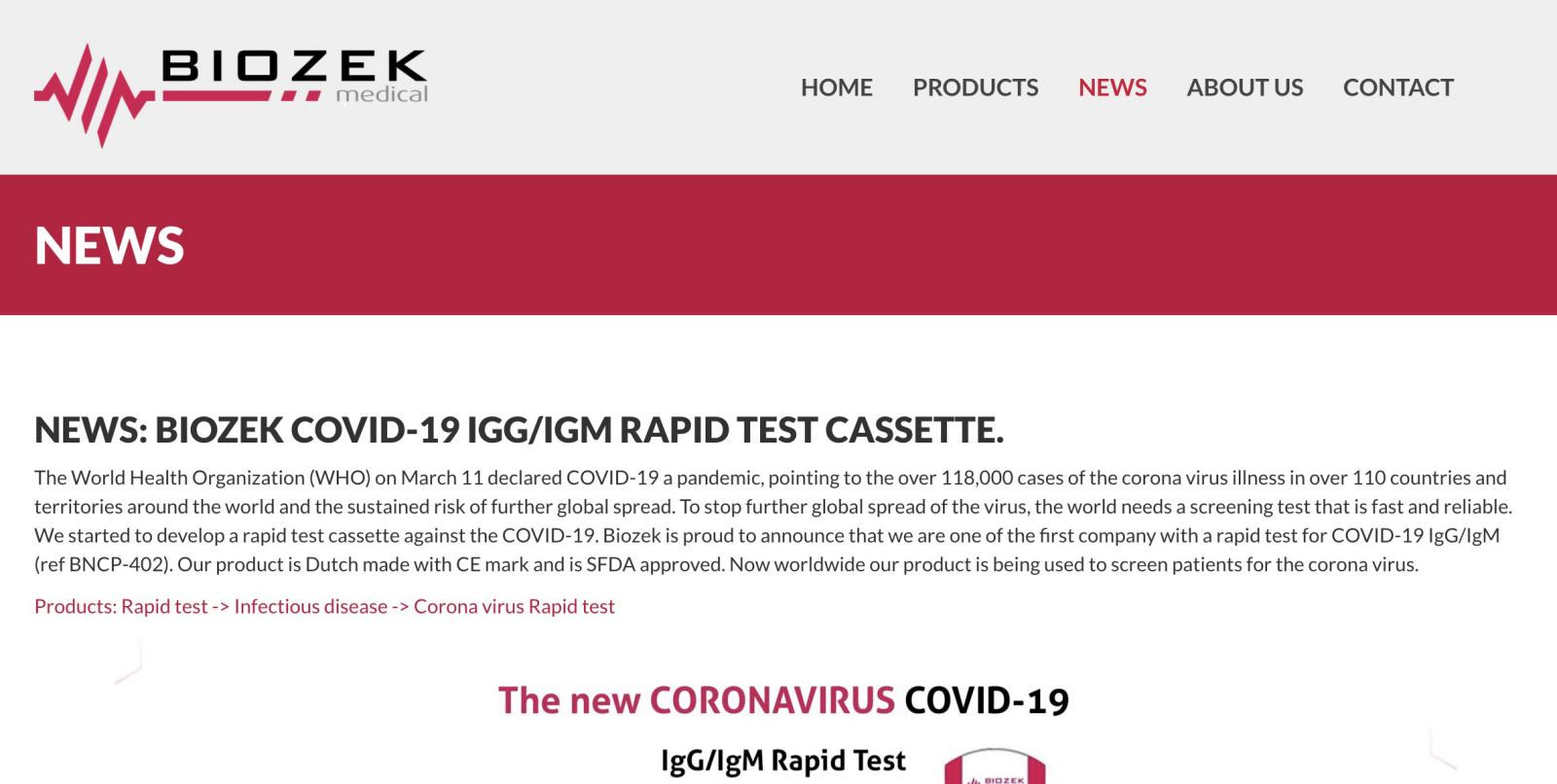
Thirty thousand ‘Dutch-made’ COVID-19 rapid antibody tests purchased by the Georgian Government were actually relabelled tests produced in China, it has emerged. Doubts have also been raised about whether the accuracy of the tests, sold by Dutch biotechnology firm Inzek, match Inzek’s claims.
On 15 April, TBC Bank gifted 5,000 of the tests, marketed under the name Biozek, to the Georgian government.
On 24 April, the Health Ministry purchased 30,000 additional tests for ₾930,000 ($290,000) through a simple procurement from Georgian medical importer Solemart.
In an annexe to the procurement order, Deputy Health Minister Giorgi Tsotslokauri wrote that the tests provided by TBC had been evaluated positively by the National Centre for Disease Control.
The Georgian Government procurement order states that the manufacturer of the tests was Inzek International Trading, the Netherlands.
However, an investigation by journalists from investigative platform the OCCRP and partners including Dutch investigative outlet Investico, discovered that the Biozek tests were actually relabelled tests produced by a Chinese firm under the name Alltest.
When confronted with the allegations, Inzek CEO Zeki Hamid admitted that the tests were made in China.
‘The party in China is a really professional manufacturer and they have official certificates’, the OCCRP quoted him as saying.
‘Asked why the tests were promoted as Dutch-made on the website, Hamid said, “Maybe there is one word wrong. Maybe we should correct that.” The website was changed the following day, April 29, to remove the claim’, the OCCRP wrote.

The Biozek tests were reportedly distributed through a network of sellers globally. In a phone conversation with the OCCRP, a representative of Swiss company Spring Healthcare, Wasay Bhatti, mentioned that ‘even the box said [the tests] were made in the Netherlands’.
Spring Healthcare supplied the tests to a clinic in Macedonia where a patient who tested negative died of COVID-19 three days later.
At least 350 of the tests were also brought to Azerbaijan, by Baku based cultural organisation the Nizami Ganjavi International Centre.
With support of #Kingold @CCWF_AU @NizamiGanjaviIC brought to Azerbaijan 350 testers for #COVID19 as well as FFP2 protection masks. We have to work together to fight #coronavirus pic.twitter.com/afLBu2PwGZ
— Nizami Ganjavi International Center – NGIC (@NizamiGanjaviIC) April 9, 2020
‘Less accurate than claimed’
Journalists in the Netherlands and other countries have also called into question the claimed accuracy of the tests.
According to the OCCRP, the Alltest test ‘has been found in some independent trials to be less accurate than claimed.’
‘The UK government reportedly cancelled a multi-million-dollar order for Alltest kits after a review led by Oxford University found that Alltest and another Chinese brand failed to meet basic standards for accuracy’, the report said.
Dutch newspaper Trouw cited two studied which found the clinical trial data insufficient for Inzek to claim ‘Biozek rapid test has a 98% score for IgG and 96% for IgM’ as is written on the company’s website.
Inzek has denied the accusations that the test was less accurate than claimed, stating that ‘Platform Investico and Newspaper Trouw have not done proper research on the product Biozek’. They accused them of relying on the opinions of just two studies; the company said they were pursuing legal action.
A spokesperson for the Georgian Ministry of Health told OC Media they were not aware of the allegations.
The Georgian importer of Biozek tests, Solemart, insisted that the tests were manufactured in the Netherlands.
Solemart’s founder and director, Zurab Tukvadze, told OC Media that this was not the first time they had partnered with Inzek, which he described as a ‘high-level company’.
What are antibody tests and how are they used in Georgia
Antibody tests, while taking only 10–15 minutes to give results, have demonstrated a relatively high chance of giving false-negative results compared to other testing methods.
They test for IgM and IgG, types of antibodies in a person’s blood which fight the virus. IgM appears within 3-5 days of the clinical manifestation of the virus while IgG needs 10-14 days.
This creates a substantial gap when infection can occur but will not be discovered.
According to Georgia’s current testing protocols, antibody tests are being performed on the staff of strategic or at-risk sectors who are not showing symptoms.
These include medical personnel, the armed forces, prisoners, patients in psychiatric facilities, people in elderly homes, as well as priests.
According to Georgia’s current testing protocol, medical staff and other strategic workers must test IgM positive before being tested using PCR tests, which are considered the most effective tests.
Antibodies test are also performed on patients in fever centres in combination with rapid antigen tests.
This article was prepared with support from the Friedrich-Ebert-Stiftung (FES) Regional Office in the South Caucasus. All opinions expressed are the author’s alone, and do not necessarily reflect the views of FES.








